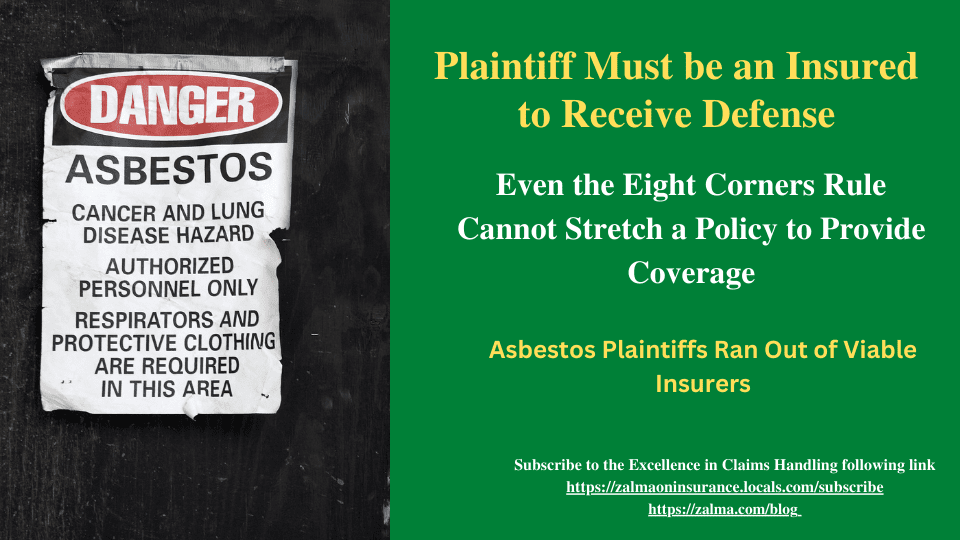Plaintiff Must be an Insured to Receive Defense

Even the Eight Corners Rule Cannot Stretch a Policy to Provide Coverage
Asbestos Plaintiffs Ran Out of Viable Insurers
See the full video at https://rumble.com/v1kotah-plaintiff-must-be-an-insured-to-receive-defense.html and at https://www.youtube.com/watch?v=MzwDtp89n-4
Brilliant National Services, Inc. (“Brilliant”) appealed a summary judgment rendered in favor of the defendant, Lexington Insurance Company (“Lexington”), which dismissed all of Brilliant’s claims against Lexington with prejudice and declared that Lexington has no duty to defend or indemnify Coastal Chemical Company, LLC (“CCC, LLC”).
In Brilliant National Services, Inc. v. The Travelers Indemnity Company And Lexington Insurance Company, No. 2021 CA 1471, Court of Appeals of Louisiana, First Circuit (September 7, 2022) the Louisiana Court of Appeals resolved the coverage dispute.
FACTS
Brilliant sued Lexington (among other defendants), seeking contribution for the costs of defending CCC, LLC in a number of asbestos exposure personal injury lawsuits filed in various state courts in Louisiana, beginning in 2011. Brilliant alleged that Lexington issued a general liability insurance policy to its insureds for the period of August 20, 1986, through August 20, 1987 (“Lexington policy”).
Brilliant alleged that certain plaintiffs in the asbestos lawsuits claimed that CCC, LLC was the successor to an insured entity under the Lexington policy that was alleged to have manufactured, distributed, marketed, or sold asbestos-containing products. Brilliant claimed that if CCC, LLC was found to be the successor to an insured entity under that Lexington policy, then the insured entity’s rights under the policy transferred to CCC, LLC by operation of law. Brilliant further alleged that regardless of whether CCC, LLC was the successor of an entity insured under the policy, Lexington owed CCC, LLC a duty to defend based on the allegations raised in the asbestos lawsuits and the terms and conditions of the Lexington policy.
Brilliant sought declaratory judgment that Lexington owed a duty to defend CCC, LLC in the asbestos lawsuits. Brilliant also sought judgment in its favor and against Lexington for 1/7 of all attorney’s fees and costs paid by Brilliant in defense of CCC, LLC in the asbestos lawsuits, together with legal interest, costs, and all other relief to which Brilliant may be entitled.
Lexington answered, raising numerous affirmative defenses and moved for summary judgment, seeking a judgment in its favor declaring that CCC, LLC has no rights under the Lexington policy; dismissing the claims asserted by Brilliant; and awarding judgment in favor of Lexington on itsdemand against Brilliant and CCC, LLC. Brilliant and CCC, LLC opposed the motion. The trial court granted Lexington’s motion for summary judgment; dismissed all of Brilliant’s claims against Lexington with prejudice; and declared that Lexington has no duty to defend or indemnify CCC, LLC.
SUMMARY JUDGMENT ON INSURANCE COVERAGE
Summary judgment declaring a lack of coverage under an insurance policy may not be rendered unless there is no reasonable interpretation under which coverage could be afforded when applied to the undisputed material facts shown by the evidence supporting the motion. Where the facts are undisputed and the matter presents a purely legal question, summary judgment is appropriate.
DISCUSSION
An insurer’s duty to defend its insured arises solely under contract. Generally, the insurer’s obligation to defend suits against its insured is broader than its liability for damage claims. An insurer’s duty to defend its insured is determined by the allegations of the plaintiffs petition, with the insurer obligated to furnish a defense unless from the petition, it is clear the policy unambiguously excludes coverage. An insurer’s duty to defend suits on behalf of an insured presents a separate and distinct inquiry from that of the insurer’s duty to indemnify a covered claim after judgment against the insured in the underlying liability case.
Lexington’s Insureds
In moving for summary judgment, Lexington argued that it had no duty to defend or indemnify CCC, LLC, nor its subrogee, Brilliant, because CCC, LLC is not and has never been one of Lexington’s “insureds.”
The Lexington policy defined “named insured” as: “‘named insured’ means the person or organization named in Item 1 of the declarations of this policy[.]” The policy lists the “named insured” as Coastal, Inc. and Coastal Chemical Co.
Coastal, Inc. and Coastal Chemical Co. were the “Persons Insured” under the Lexington Policy. The parties do not dispute that the Lexington policy expired prior to the formation of CCC, LLC’s predecessor, the second Coastal Chemical Co., Inc., which was incorporated on December 8, 1987. Because neither CCC, LLC nor its predecessor was a party to the Lexington policy, CCC, LLC cannot be a “named insured” under the Lexington policy. Furthermore, neither CCC, LLC nor its predecessor falls into the definition of “Persons Insured” under the Lexington Policy.
Successor Liability
Lexington argued that CCC, LLC could only be entitled to defense and indemnity under the Lexington policy if CCC, LLC or its predecessor acquired the named insureds’-Coastal, Inc. or Coastal Chemical Co.-rights and interests in the Lexington policy. Lexington explained that its policy has never been transferred to CCC, LLC or its predecessor. In 1987, Coastal Chemical Co., Inc. acquired the chemical distribution business of Lexington’s insured, Coastal, Inc. Brilliant and CCC, LLC identified the 1987 asset transfer agreement as the only documents through which the Lexington policy could have been conveyed, sold, or otherwise transferred from Lexington’s insured to Coastal Chemical Co., Inc. The 1987 asset transfer agreement documents shows a list of transferred assets and the Lexington policy is not listed nor referenced in the asset transfer agreement.
Lexington avers that because its policy was not transferred from its insureds to Coastal Chemical Co., Inc. in the 1987 asset transfer agreement, CCC, LLC never acquired the policy nor any rights thereunder from its predecessor. Accordingly, Lexington argued it has no obligation to defend or indemnify CCC, LLC or its subrogee, Brilliant.
The key consideration is whether the successor is in fact a “continuation” of the predecessor. The threshold requirement to trigger a determination of whether successor liability is applicable under the “continuation” exception is that one corporation must have purchased all or substantially all the assets of another. In the instant case, CCC, LLC admits that Coastal Chemical Co., Inc. did not purchase all the assets of Coastal, Inc., only all the assets “necessary to operate a chemical distribution business.” There is no dispute that Coastal, Inc. retained assets and remained in business after the 1987 asset transfer.
Since the 1987 asset transfer agreement excluded the Lexington policy from the list of assets acquired by CCC, LLC’s predecessor from Lexington’s insured. To conclude that CCC, LLC acquired the Lexington policy, the appellate court would have to ignore the parties’ contract.
The Eight-Corners Rule
Lexington contended that the appellants could not point to any factual allegations made by the plaintiffs in the underlying asbestos lawsuits which, if assumed true, transforms CCC, LLC into a “Persons Insured” under the Lexington policy.
Cases applying the “eight-comers rule” hold that an insurer owes a duty to defend if, assuming the factual allegations are true, there would be both (1) coverage under the policy, and (2) liability to the plaintiff.
The allegations of the petition are liberally interpreted in determining whether they set forth grounds that bring the claims within the scope of the insurer’s duty to defend. An insurer’s duty to defend arises whenever the pleadings against the insured disclose even a possibility of liability under the policy. Although the allegations of the petition may ultimately turn out to be incorrect or untrue, the insurer would still be obligated to provide a defense.
Even though the asbestos plaintiffs allege that CCC, LLC “negligently and defectively designed, manufactured, marketed, distributed, supplied, sold and used” the “asbestos products,” those allegations do not trigger coverage under the four comers of the Lexington policy. The pertinent Lexington policy provision clearly defines “Persons Insured” and includes only specific individuals. None of the asbestos plaintiffs’ allegations could, even if proven, transform CCC, LLC into an individual defined as a “Persons Insured” under the Lexington Policy-i.e., an executive officer, director, or stockholder of the “named insured” Coastal, Inc. or Coastal Chemical Co.
The Court of Appeal affirmed the trial court’s judgment.
ZALMA OPINION
Asbestos claims have destroyed or bankrupted multiple insurers. As a result those insurers still viable are, like Lexington in this case, the targets of defendants seeking defense and indemnity for claims of injury by exposure to asbestos. In this case the Louisiana Court of Appeal could find no coverage because there was no way that they could stretch the language of the policy to make the plaintiffs fit within the definition of “insured” in the Lexington policy. No stranger to a liability insurance policy can be allowed defense or indemnity.
(c) 2022 Barry Zalma & ClaimSchool, Inc.

Barry Zalma, Esq., CFE, now limits his practice to service as an insurance consultant specializing in insurance coverage, insurance claims handling, insurance bad faith and insurance fraud almost equally for insurers and policyholders. He practiced law in California for more than 44 years as an insurance coverage and claims handling lawyer and more than 54 years in the insurance business. He is available at http://www.zalma.com and zalma@zalma.com.
Subscribe and receive videos limited to subscribers of Excellence in Claims Handling at locals.com https://zalmaoninsurance.locals.com/subscribe.
Subscribe to Excellence in Claims Handling at https://barryzalma.substack.com/welcome.

Now available Barry Zalma’s newest book, The Tort of Bad Faith, available here.
The new book is available as a Kindle book, a paperback or as a hard cover.
Write to Mr. Zalma at zalma@zalma.com; http://www.zalma.com; http://zalma.com/blog; daily articles are published at https://zalma.substack.com. Go to the podcast Zalma On Insurance at https://anchor.fm/barry-zalma; Follow Mr. Zalma on Twitter at https://twitter.com/bzalma; Go to Barry Zalma videos at Rumble.com at https://rumble.com/c/c-262921; Go to Barry Zalma on YouTube- https://www.youtube.com/channel/UCysiZklEtxZsSF9DfC0Expg; Go to the Insurance Claims Library – https://zalma.com/blog/insurance-claims-library/
Like this:
Loading…
Related



